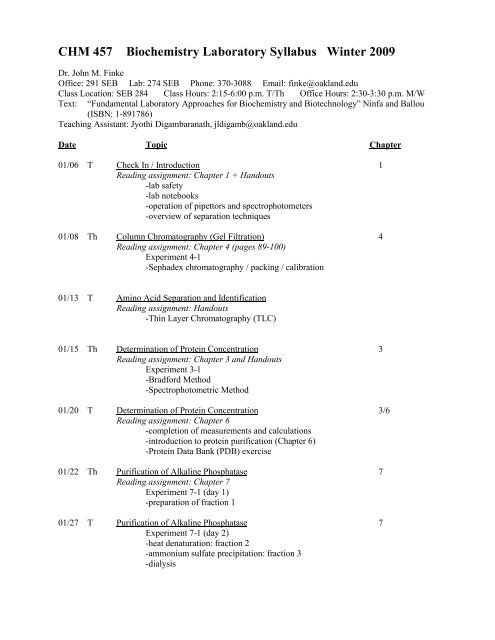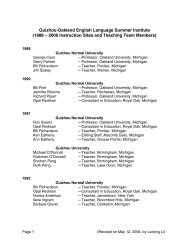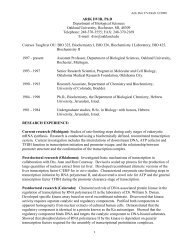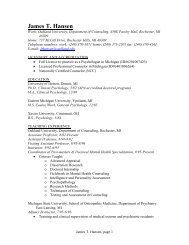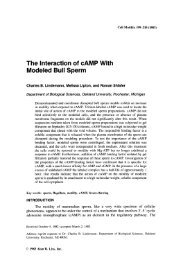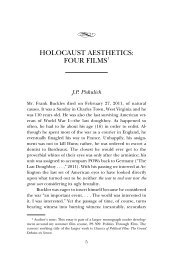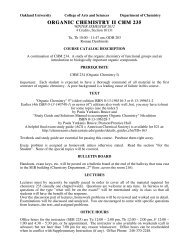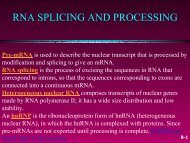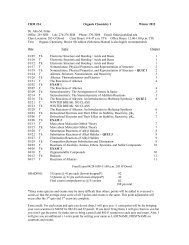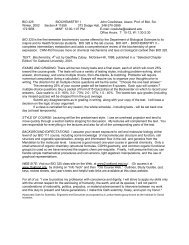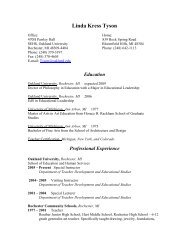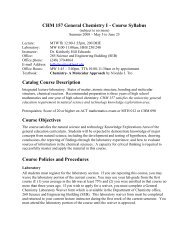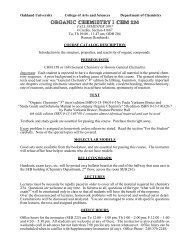CHM 457 Biochemistry Laboratory Syllabus Winter 2009
CHM 457 Biochemistry Laboratory Syllabus Winter 2009
CHM 457 Biochemistry Laboratory Syllabus Winter 2009
You also want an ePaper? Increase the reach of your titles
YUMPU automatically turns print PDFs into web optimized ePapers that Google loves.
Date Topic Chapter01/29 Th Purification of Alkaline Phosphatase 7Experiment 7-1 (day 3)-DEAE cellulose chromatography-enzyme assay on all fractions02/03 T Characterization of Alkaline Phosphatase 5Reading assignment: Chapter 5Experiment 5-2 (some reference to Experiment 5-1)-native gel and activity assay-protein determination-enzyme assay (if necessary)02/05 Th Enzyme Kinetics - Alkaline Phosphatase 8Reading assignment: Chapter 8Experiments 8-1 and 8-202/10 T Catch-up Day02/12 Th EXAM 1 (practical)Practical Based on Experiments 9-1 and 9-202/17 T Plasmid Isolation 11Reading assignment: Chapter 11 (pages 277-299) and Handouts-microscale isolation of plasmid DNA-DNA restriction incubation02/19 Th Plasmid DNA Restriction and AnalysisReading assignment: Handout03/03 T Catch-up Day03/05 Th Computer-Based PCR Primer Lab 12Reading assignment: Chapter 12 and Handout03/10 T PCR Technology 12Reading assignment: Experient 12-1 and Handout03/12 Th Characterization of PCR Product 12Reading assignment: Handout-introduction to subcellular fractionation03/17 T Subcellular FractionationReading assignment: Handout-preparation of homogenate-differential centrifugation03/19 Th Subcellular Fractionation 11-biuret assay-marker enzyme assay
Date Topic Chapter03/24 T Microsomal Membrane CharacterizationReading assignment: Experiment 5-1 and Handout 5-preparation of homogenate-differential centrifugation03/26 Th Microsomal Membrane Characterization-SDS-PAGE of membrane proteins-TLC of membrane lipids03/31 T Radiation Safety-overview-training04/02 Th Radioisotope Assay of Fatty Acid OxidationReading assignment: Handout04/07 T <strong>Laboratory</strong> Decontamination-data analysis-discussion04/09 Th Make-Up DayReading assignment: Handout04/14 T Lab Clean-Up/Check out04/23 Th EXAM 2 (written)
<strong>Biochemistry</strong> <strong>Laboratory</strong> BCM <strong>457</strong><strong>Winter</strong> <strong>2009</strong>General CommentsRegistration:The last day for a “no grade” drop and 100% refund is January 20 and the last day for an officialwithdrawal is March 17.Due Dates for Lab Reports:The lab reports are due approximately one week after a particular set of linked experiments are scheduledto be finished. There will be a 3 point per day deduction for late reports.ExperimentDue DateSeparations: Gel Filtration, TLC, CE 01/20Measurement of Protein Concentration 01/27Purification of Alkaline Phosphatase 02/10Enzyme Kinetics 02/17Plasmid Isolation and Characterization 03/05PCR 03/19Subcellular Fractionation and Characterization 04/02Radioisotopic Assay 04/14Grading:Lab Report: 25 points each (200 points total)Exams: 50 points each (100 points total)Lab Karma: 50 pointsThis course is a capstone course for writing. As such, Lab Reports will be graded both on writtenproficiency as well as laboratory performance. Lab reports will follow the standard science journal format:Abstract, Introduction, Materials and Methods, Results, and Discussion.1. Abstract: Summarize why you performed the experiment, your results, and your conclusions.2. Introduction: Provide a brief background on the method, why you are using it, and its application toreal-world problems.3. Materials and Methods: Summarize the lab procedure. You don’t need every little detail. Make sure tonote alterations from the planned procedure due to problems.4. Results: With proper referencing to the Methods, describe the results (data and/or observations) youobtained from your experiments. This is also the proper time to demonstrate the processing of your data(i.e. calculations). Use of graphs and tables is often helpful here.5. Discussion: What are your conclusions from the results? Are they reasonable? Why is the resultreasonable? If not the expected result, explain.
For each lab report, I will give you handout of what I expect from you. I highly recommend you doeverything the handout asks for. More importantly, make sure you understand what I am asking of you.Each lab report is different but the breakdown of the 25 points on each lab reports is approximately asfollows:1. Content ( 6 points ): Is everything you did in lab explained in the lab report? Can someone who neverdid the lab get the idea of what happened?2. Performance ( 6 points ): To what level did you obtain the “correct” results in the lab. Also, did youperform the calculations correctly?3. Communication: (6 points): Good writing communicates well with a minimal amount of wording.Points will be given based on how easy and quickly it is for me (or the T.A.) to read the report.Consequently, the use of schematics, graphs, and tables to communicate your results efficiently isrecommended. Neatness and organization fall under this category.4. Discussion (3 points): Is the logic of your thoughts in the discussion reasonable?5. Grammar, Spelling, and Punctuation (2 points): All word processors can check this. Enough said.6. Scientific Context (2 points): How well did you place your report into the background of scientificcontext?At least three novel references (REAL journal articles – not textbooks, websites, Newsweek) should becited in the reports using the following format.Authors, Journal Title, Journal Name, Year, Volume: Pages.Example:Digambaranath, J.L. and Finke J.M., “The most awesome lab report ever”, Journal of Epic LabReports, 2007, 1:1-10.Lab Karma consists of 25 points, assigned by me for punctuality and general lab performance. The other25 Karmic points will be given by your lab partner. So it pays to keep your lab partner happy.There will be no make up exams. Missed exams and missing lab reports will be recorded as zero.Final grades in this course will be assigned on the basis of the grade distribution for the entire class(curve). At the end of each month, the cumulative scores will be shown in class so you can determinewhere you stand relative to the rest of the students. If you are concerned about your grade I encourage youto talk with me so that we can assess the problem and develop potential solutions.Attendance:Lab classes cannot be performed outside the appointed times and any absences place additional work onyour lab partner on the day you miss. For these reasons, it is very important to attend ALL lab courses. Iwill allow one absence (no questions asked) during the semester. In addition, I will allow one additionalabsence for a prearranged reason (scientific meeting, medical procedure, etc.) but you must inform me,and your lab partner, know at least one week in advance. I will allow additional exceptions for schoolrelatedactivities (NCAA sports events, etc.). I will deduct 10 points per absence beyond these exceptions.Safety:We will spend the first day discussing safety. One thing you will need each day of lab is a pair of labglasses and lab coat. THE LAB GLASSES AND COAT ARE MANDATORY. If you do not have them, Iwill not let you in to do your lab and this will count as an absent day if you cannot get them by the timethe lab is done (5 p.m.).
Policy on Plagiarism:During this course, you will be working in groups. In addition, there may be times during the semesterwhen, for one reason or another, and with the instructor’s permission, you will be using data obtained bysomeone else for the write up of your notebooks. The sharing of information, data, or ideas in thesecircumstances is allowable, however, appropriate acknowledgement of the source of such contributions isrequired. Furthermore, you need to show that you did all the calculations on your own, with your ownanalysis, results, and discussion. Even if similar, there should be a slightly different interpretationbetween two lab partner’s discussion sections since there will be plenty of room for interpretation basedon the results of the experiments. You can still work in groups – however, the final write up should beyour own. If insufficient evidence of independent work is observed, the write-ups will be submitted tothe academic conduct committee for adjudication.


